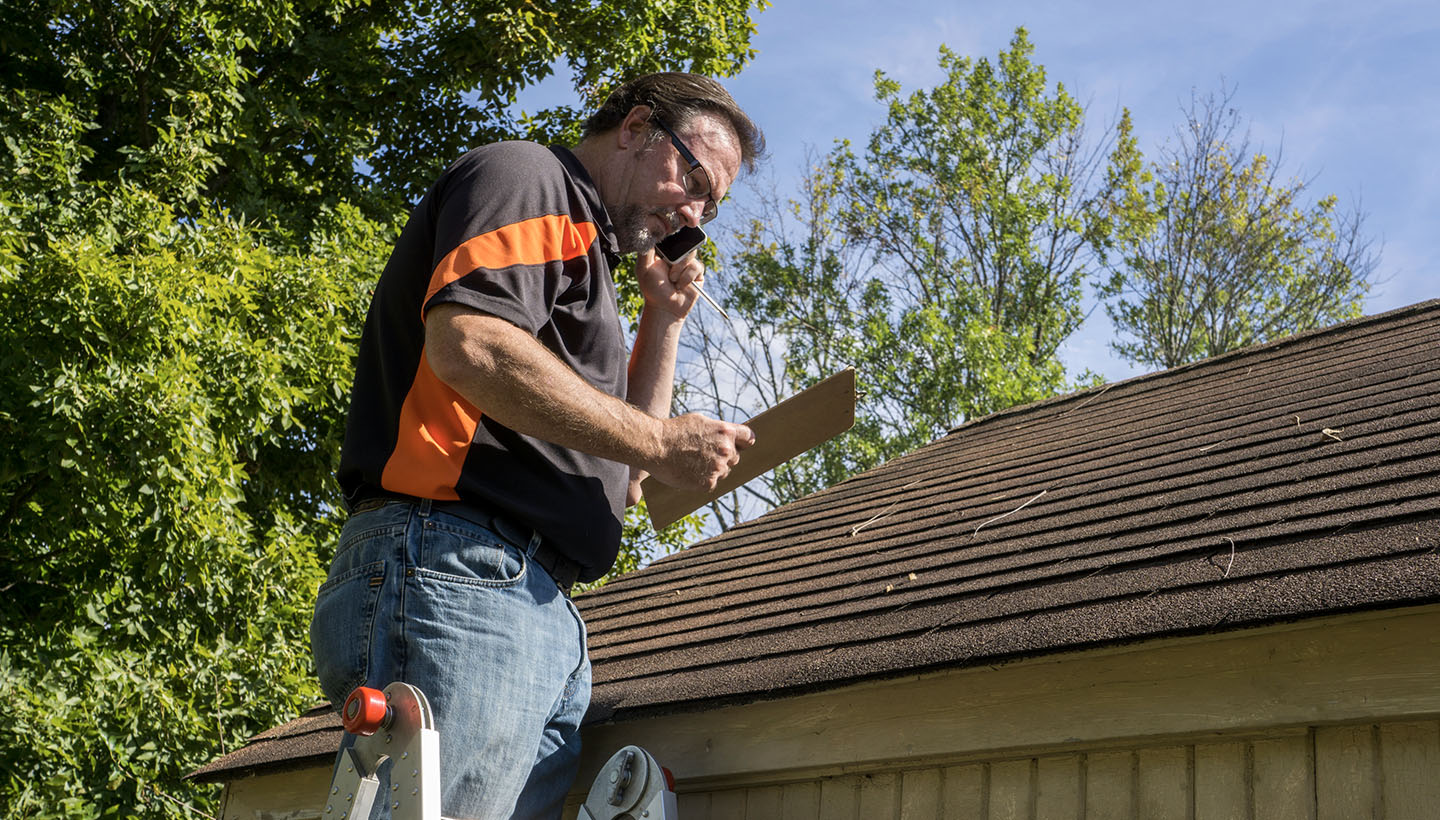
What Are Home Inspectors Not Allowed To Do?
These days, there are a lot of misconceptions around what home inspectors do, what they don’t have to do, and what they’re not allowed to do. Some of these things are even a little surprising. Keep reading and let’s explore 12 things home inspectors aren’t allowed to do (or can choose not to do) during a home inspection.
Home Inspectors Should Not Risk Their Safety During the Inspection
Both Standards of Practice (“Standards”) from the International Association of Certified Home Inspectors (InterNACHI™) and the American Society of Home Inspectors (ASHI) state that a home inspector can use their judgment to decide if an area is safe or not safe to visually inspect.
If safety hazards prevent the inspection of an area, system, or component, the inspector should note a disclaimer in the inspection report and move on to the next area of the inspection. Home inspectors have the right and the legal responsibility to keep themselves safe on the job.
Home Inspectors Don’t Have to Walk on Roofs
Home inspectors don’t have to walk on roofs, according to both associations’ Standards.
Some inspectors do walk on roofs when conditions appear safe and they’re confident in doing so. But many inspectors understandably use alternative methods to visually inspect roofs safely from the ground. These may include drones, thermal imaging cameras, and telescopic pole cameras.
If there is a problem area or major defect with a roof during the visual inspection, the inspector should note what they see in their report and recommend a more thorough inspection by a qualified roof inspector.
Home Inspectors Don’t Have to Move Items to Access Hard-to-Reach Areas
According to inspection standards, the homeowner must move bulky items to allow the home inspector to access hard-to-reach areas and out-of-sight systems. If the inspector can’t access the areas they need to visually inspect, they should note the areas that were inaccessible in the home inspection report and continue with the inspection.
Indoor items home inspectors are not required to move include (but are not limited to):
- Rugs
- Carpeting
- Wall coverings
- Furniture
- Ceiling tiles
- Window coverings
- Plants
- Debris
- Equipment
- Pets
Outdoors, home inspectors don’t have to remove any natural elements that obstruct a visual inspection, including:
- Ice
- Snow
- Water
- Dirt
Home Inspectors Don’t Have to Enter Areas That Appear Unsafe
During inspections, home inspectors don’t have to enter areas that appear unstable or unsafe. These areas commonly include crawl spaces, attics, and underground locations where equipment is stored.
Here’s what each association’s Standards states:
| Area | InterNACHI™ Standard | ASHI Standard |
|---|---|---|
| Crawl Space Inspections | The inspector is not required to enter any crawl space that is not readily accessible, or where entry could cause damage or pose a hazard to him/herself. | The inspector is not required to enter under-floor crawl space areas that have less than 24 inches of vertical clearance between components and the ground or that have an access opening smaller than 16 inches by 24 inches.
And: The inspector is not required to inspect under-floor crawl spaces that are not readily accessible. |
| Attic Inspections | The inspector is not required to enter the attic or any unfinished spaces that are not readily accessible, or where entry could cause damage or, in the inspector’s opinion, pose a safety hazard. | The inspector is not required to traverse attic load-bearing components that are concealed by insulation or by other materials.
And: The inspector is not required to inspect attics that are not readily accessible. |
| Underground Inspections | The inspector is not required to inspect underground items, such as, but not limited to, lawn irrigation systems or underground storage tanks (or indications of their presence), whether abandoned or actively used. | The inspector is not required to inspect underground items including, but not limited to, underground storage tanks and other underground indications of their presence, whether abandoned or active. |
Home Inspectors Shouldn’t Diagnose Defects They See
In an inspection report, a home inspector will note their inspection methods and any material defects they observe. But they don’t and shouldn’t diagnose problems or the causes of defects.
As the InterNACHI™ Standards states: “The general home inspection will not reveal every issue that exists or ever could exist, but only those material defects observed on the date of the inspection.” ASHI’s Standards add: “The home inspector is not required to determine the causes of conditions or deficiencies…and the methods, materials, and costs of corrections.”
The inspection report should instead include a recommendation to get a specialized inspection for any area that may have a material defect.
Home Inspectors Don’t Estimate the Life of Systems or Components in the Home
Home inspectors shouldn’t estimate the remaining lifespan of home systems or components. Both InterNACHI™ and ASHI list this limitation in their Standards. Homebuyers and homeowners might ask the inspector for an opinion about the condition of a component, but the home inspector does not have to offer it and, legally, they shouldn’t.
Home Inspectors Don’t Inspect Non-Working or Specialized Systems
Home inspectors shouldn’t inspect non-working or specialized systems that are not part of a standard home inspection. This includes non-working systems, whether they’re just not installed, shut down, or otherwise inoperable.
Examples of specialized systems that don’t have to be inspected include:
- Underground storage tanks
- Detached structures other than carports and garages
- Window air conditioners or through-wall AC units
- Central vacuum systems
- Flue and chimney vents
- Outdoor cooking appliances
- Sprinkler systems
- Decorative elements
Home Inspectors Are Not Allowed to Give Opinions on Whether or Not a Home Is a Sound Investment
Ethically, home inspectors shouldn’t give homebuyers (or their real estate agents) opinions on whether a home is a sound investment. It’s an impossible question to answer, after all. Some homes, regardless of their many defects, might still be great investments over time. And some homes that have little defects on the day of inspection might turn out to be poor investments over time.
Legally, home inspectors aren’t allowed to answer this question. The same goes for offering opinions on a home’s fair market value, resale value, sale price, and any kind of real estate advice.
Home Inspectors Don’t Tell Clients Their Home “Passed” or “Failed” an Inspection
There is no “pass” or “fail” in home inspections. Home inspectors visually assess the condition of a property and complete an inspection report. The report includes the intelligence a homebuyer or seller needs to make educated decisions on repairs needed and whether to invest in the home. The report should be an independent, impartial evaluation and make no mention of a “passing” or “failing” score.
Home Inspectors Don’t Inspect or Offer Contracted Services For Properties Where They Have a Financial Interest
Home inspectors should never inspect properties in which they have or stand to gain financial interest. The same goes for offering repair, renovation, or contracting services outside of a home inspection. It’s unethical for a home inspector to perform repairs or renovations on a home they’ve recently inspected. Some state laws even indicate the inspector must wait at least 12 months after performing a home inspection to offer repair or renovation services for the home.
Home Inspectors Don’t Speculate On or Enforce Building Codes
Home inspectors are not allowed to speculate on whether a house has code violations. They also can’t condemn property. Only local government officials can determine compliance with building codes and enforce code rules. In fact, home inspectors aren’t required to know building codes, though it’s helpful for background knowledge.
Home Inspectors Don’t Determine Property Lines & Boundaries
Home inspectors do not determine property lines and boundaries. This is a land surveyor’s responsibility. Land surveyors are trained to measure, mark, and outline property boundaries, easements, and encroachments – and correctly report the size of a property.
Learn All the Do’s and Don’ts of Home Inspection With AHIT
There are lots of “do’s” and “don’ts” in home inspection. Fortunately, when you train with AHIT, you’ll learn the Standards of Practice in-depth — from how to inspect home systems and write inspection reports to how to communicate findings to clients. Plus, in our hands-on field training courses, you’ll practice home inspections at real homes with real clients, learning everything you need for success. Learn more about how to become a home inspector in your state.




